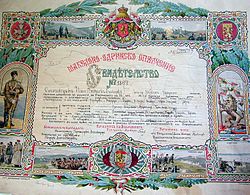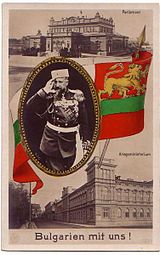- Negotiations of Bulgaria with the Central Powers and the Entente
-
The Negotiations of Bulgaria with the Central Powers and the Entente were attempts of the two belligerents in World War I, the Central Powers and the Entente to involve Bulgaria in the war on their side. They are also called The Bulgarian summer of 1915.
When the war broke out the country was in an unfavourable situation - the country had just suffered a national catastrophe following the Second Balkan War in which Serbia, Greece, Romania and the Ottoman Empire defeated Bulgaria (with the Bulgarian army being victorious) and took large territories populated mainly with Bulgarians. In August 1914, nearly a month after the war broke out the Bulgaria Prime-minister Vasil Radoslavov declared that Bulgaria would remain neutral. That, however, was only temporary as the Bulgarian government expected an opportune moment and favourable terms to enter the war and regain its lands.
Bulgaria was important for both belligerents because of its strategic geo-political position on the Balkans and its strong army. If Bulgaria entered the war on the side of the Central Powers Serbia would have been defeated which could influence the still neutral Romania and Greece. If Bulgaria allied itself with the Entente it would have disrupted the links of Germany and Austria-Hungary with the Ottoman Empire and would have taken the straits opening a sea route to Russia. The Entente offered Bulgaria Eastern Thrace to the west of the line Midia-Enos and uncertain guarantees for Macedonia. However, Serbia and Greece were reluctant to make any concessions to Bulgaria.
The Central Powers offered Vardar Macedonia and eastern Serbia and in case Romania or Greece enter the war Southern Dobrudzha and Aegean Macedonia respectively. Germany also guaranteed a 500 million marks military loan. In September Bulgaria signed the Bulgaria-German treaty, Secret Bulgarian-German agreement, the Military convention between Germany, Austria-Hungary and Bulgaria and the Bulgarian-Turkish convention.
References
- Илчев, И., България и Антантата през Първата световна война
- Porter, Ch. The Career of Theophile Delcasse. Wesport, Connecticut, 1975
- Churchill W.S. The Worm Crisis. New York. Charles Scribner Sons, 1949
- Стателова, Ел., История на България
- Влаховм Т., Отношения между България и Централните сили по време на войните 1912- 1918г
- Райчевски, Ст., Българите в световните хроники 1912-1919
Bulgaria in World War I Prelude South-western front: Serbian Campaign, Macedonian front Romanian front • Outcome • Others Important persons 1912–1913
1913
- Treaty of London
- Second Balkan War
- Treaty of Bucharest
- Treaty of Istanbul
Neutrality1915
- Negotiations of Bulgaria with the Central Powers and the Entente
- Bulgarian-German treaty
- Secret Bulgarian-German agreement
- Military convention between Germany, Austria-Hungary and Bulgaria
- Bulgarian-Turkish convention
- Mobilization
CommandersNikola Zhekov • Kliment Boyadzhiev • Georgi Todorov• Stefan Nerezov • Vladimir Vazov
 Serbia: Radomir Putnik • Živojin Mišić • Stepa Stepanović • Petar Bojović;
Serbia: Radomir Putnik • Živojin Mišić • Stepa Stepanović • Petar Bojović;
 France: Maurice Sarrail • Adolphe Guillaumat • Franchet d'Esperey;
France: Maurice Sarrail • Adolphe Guillaumat • Franchet d'Esperey;
 United Kingdom: George Milne;
United Kingdom: George Milne;
 Greece: Panagiotis DanglisField Armies
Greece: Panagiotis DanglisField Armies First Army
First Army Second Army
Second Army Fourth Army
Fourth Army
Battles1915
Morava Offensive Operation • Ovche Pole Offensive Operation • Kosovo Offensive Operation (1915) • Battle of Krivolak
1916
First battle of Doiran • Battle of Lerin • Battle of Struma • Monastir Offensive
1917
Second battle of Doiran • 2nd Cerna Bend • Battle of the Red Wall
1918
Battle of Skra-di-Legen • Battle of Dobro Pole • Third battle of Doiran
CommandersNikola Zhekov • Panteley Kiselov • Stefan Toshev • Todor Kantardzhiev • Ivan Kolev
 Romania: Constantin Prezan • Alexandru Averescu;
Romania: Constantin Prezan • Alexandru Averescu;
 Russia: Andrei ZaionchkovskyField ArmiesBattles
Russia: Andrei ZaionchkovskyField ArmiesBattles1916
Battle of Turtucaia • Battle of Dobrich • First Cobadin • Flămânda Offensive • Second Cobadin • Battle of Bucharest
Outcome1918 Treaty of Brest-Litovsk • Armistice of Focşani • Treaty of Bucharest • Protocol of Berlin
Outcome
- Armistice of Salonica
- Vladaya revolt
- Treaty of Neuilly-sur-Seine
Others
- Bulgarian administration in Kosovo
- Anti-military propaganda
- Ferdinand
- Aleksandar Protogerov
- August von Mackensen
- Boris Drangov
- Vladimir Vazov
- Georgi Todorov (general)
- Ivan Kolev
- Kliment Boyadzhiev
- Konstantin Zhostov
- Krastyu Zlatarev
- Nikola Zhekov
- Panteley Kiselov
- Stefan Toshev
- Stefan Nerezov
- Todor Kantardzhiev
Categories:- History of Bulgaria
- 20th century in Germany
- World War I
- 1915 in Bulgaria
Wikimedia Foundation. 2010.


